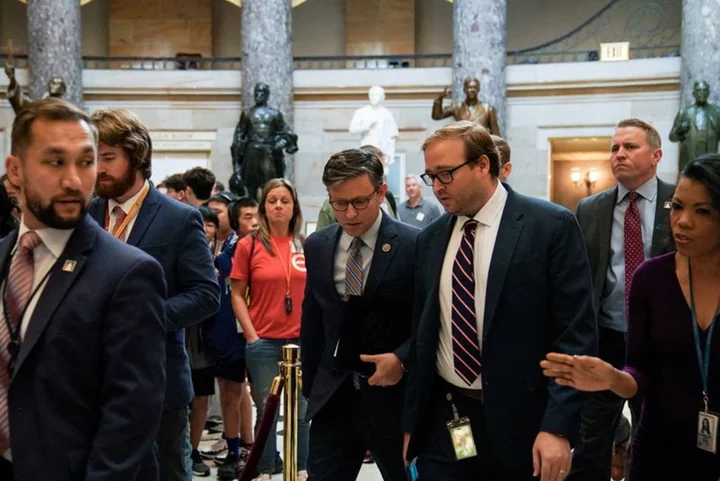By David Morgan
WASHINGTON (Reuters) -U.S. House of Representatives Republicans aim to release a stopgap measure to avert a partial government shutdown on Saturday, the morning after the Moody's credit agency lowered its outlook on the government's credit ratings to "negative."
A knowledgeable source, who spoke on condition of anonymity, said plans for the release of the continuing resolution, or "CR," were still in flux. It was also unclear what form the measure would take.
U.S. House Speaker Mike Johnson has spent days in talks with members of his slim 221-212 Republican majority about several CR options. The Republican-controlled House and Democratic-led Senate must agree on a vehicle that President Joe Biden can sign into law before current funding expires on Nov. 17.
Moody's cited political polarization in Congress as a factor in making its decision to lower the credit outlook, saying Washington may not be able to reach agreement to make its growing deficits more affordable.
The U.S. recorded a $1.7 trillion deficit last year - the largest outside of the worst of the COVID-19 pandemic - and rising interest rates mean that the cost of servicing that debt will continue to grow.
Just a few months ago, Congress brought the U.S. to the brink of defaulting on its more than $31 trillion in debt, a move that would have shaken world financial markets.
With a potential shutdown only days away, some Republicans have called for a "clean" CR that would run to mid-January and have no spending cuts or conservative policy riders that Democrats oppose.
But hardline conservatives continue to press for a measure with spending cuts, policies including tighter security at the U.S.-Mexico border and an unorthodox structure with staggered deadlines for different segments of the federal budget.
Many lawmakers warn that a prolonged partisan fight over a stopgap measure could prevent Congress from averting a shutdown.
As House Republicans debated their options this week, Senate Majority Leader Chuck Schumer took an initial procedural step toward moving his own stopgap measure.
(Reporting by David Morgan; Editing by Daniel Wallis and Grant McCool)









